The Hidden Edges
Giving up the grandiose to live the slow, silent transformations.
“Who do you think will play you in the movie?” the ruddy, tow-headed 25-year-old electrician we called Porkchop asked our group as we all sat around a cramped table in the galley — then after a beat, “I’ve got Tom Cruise.”
We were out on another mission, still in the early days of trying to get a rocket to fall from space and land on our barge 200 miles or so east of Florida (emphasis: trying). Already we anticipated victory and eventual biopics, even though the preceding missions had each ended in explosion, disappointment, and hauling the burned-out husk of the barge back to shore for many long weeks of rebuild. Yet, the magic of that team lay in its ability to never ask “if” only “when.”1
“When,” however, centered itself in every conversation:
When will the barge be ready?
When will it leave for mission?
When should we be on station for landing?
When will the rocket launch?
When will the rocket launch?
When will the rocket launch?
When will the rocket launch?
When will the rocket launch?
When will the rocket launch?
When can we be done picking up debris and head home?
While out on mission, we lived on a 170 foot long boat, an offshore supply vessel, that followed the tugboat around which in turn towed the uncrewed barge. A nearly 200 foot long vessel sounds big until you see it and realize that most of its advertised length is made up of an open work deck for the rear two-thirds. The engines, bunks, galley, storage, bridge, crew, and everything else a sea-going vessel requires must fit into the remaining sixty feet.
So beyond discussing who would star as each of us in the inevitable movie2 about our eventual success, the reason we sat around that small table in the galley was simply because there weren’t many other places to go and not much else to do. We got kicked off the bridge when the captain wasn’t feeling chatty and we couldn’t stand spending more time than we had to in our windowless bunk rooms, the sound of the waves slamming the hull right by our heads, tossed ceaselessly by every wave inside a rough cut bed frame fashioned from unpainted 2x4’s that had the air of a cheap coffin. We had deck chairs, but that was a rare treat — waves came over the sides of the back deck in all but the best weather.
So, while being out on mission sounds cool, and let me tell you it works wonders when doing pickups at the bar,3 the reality is that they’re mostly dead time. To put my own verbose twist on a well-wrought axiom about war: it was days marked by unyielding tedium blooming into lassitude for life at large, punctured by moments of such extreme emotion you’re not sure if it was excitement, terror, lust, or all three electrocuting your spleen. They are about frittering away the hours watching people take turns being seasick until something major happens, which isn’t my favorite way of spending the finite hours of my life.
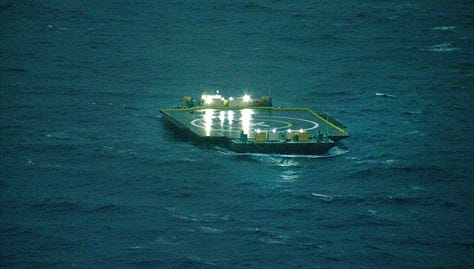
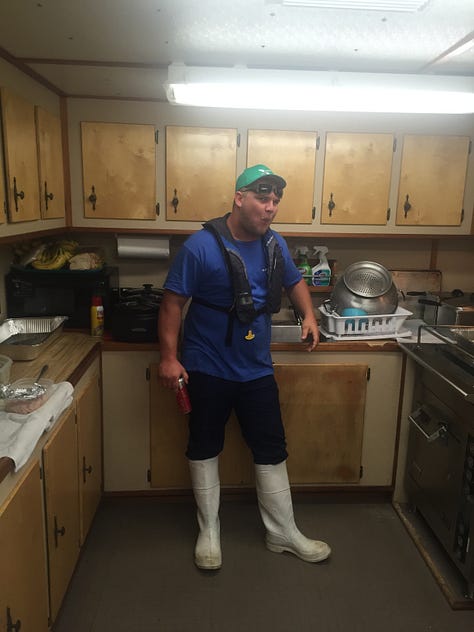
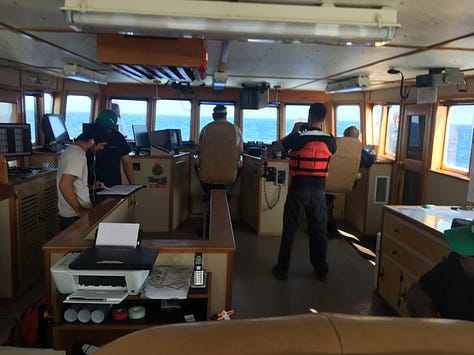
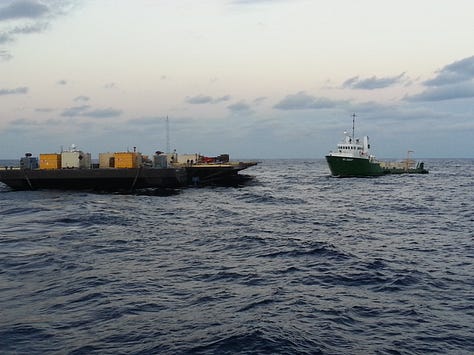
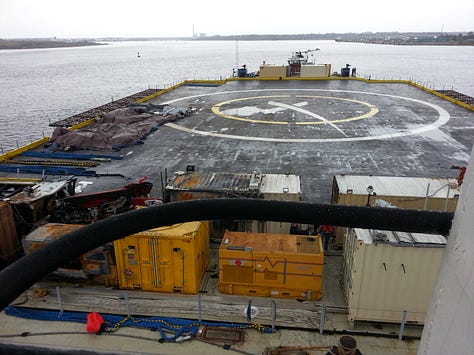

Tourism at the Hidden Edge
Yet, people constantly angled to come along. It seemed like every day I had to regale a new stranger with stories of massive storms with waves so large that they threatened to blow the windows out of the bridge that sat twenty feet above the water, chasing the barge to the Bahamas when the 3-inch tow cable snapped in a storm, frozen pizzas most nights for dinner, and the undignified (yet subtle) art of trying to stay on the toilet while it bucked like a meth-addicted bull with a pineapple up its ass.
Over time, I learned that rather than dissuading people, these stories served only to ignite a spark in their eyes, to somehow challenge their mettle. I inadvertently dredged up whatever particular flavor of unworthiness lived in their hearts and convinced them that this thing — in reality a week or so on a cramped boat — was some metaphysical cure for their lack of adventure. They sought their personal Edge, and to see who they'd be when they found it, just as I was. Many a JAFO from headquarters would somehow finagle a ride-along by sweet talking this person or that, and arrive unannounced on our docks with the sunny air of someone on holiday.
Inevitably, missions ground those boys4 to dust.
I remember one particular child arriving in flip flops, board shorts, and Ray-Bans. He had a single backpack in which, I assume, was his work computer (to do what with, I don’t know, since this was before Starlink and our limited satellite bandwidth was reserved for mission comms) and a change of tank tops. Just a few days later he was begging to go back to shore — eventually, he demanded we call him a Coast Guard chopper, which of course we did not (and could not) do just because someone was tired of being tossed around on a boat at sea. He was defeated; the spark had left. The Edge he hoped to discover faded somewhere beyond the horizon.
I felt for him because I too had experienced this particular disappointment in my own life. The idea that simply by being a tourist on someone else’s adventure we too could be transformed is alluring. This is why we identify with sports teams (saying “we” got the big win) and endless watching the Hero’s Journey play out on the big screen. Yet, that idea is also insidious.
Of course, watching a rocket fall from the edge of space and try to land is exciting. There is an undeniable shock that ran through my body every single time I’d first glimpse that rocket freefalling through the sky, dropping silently until the precise moment I was sure it couldn’t stop, and finally igniting its engines to land.
But it’s not enough to just see it — otherwise everyone watching rocket landings at the Jetties by the Cape would be similarly transformed as boosters come back into LZ-1. We could bus people in and transmute the world to a higher plane one first stage landing at a time. Just like the baby in the board shorts, you cannot be a tourist to experience. Life is to be lived and experienced.
If it’s silly to think people can be transformed on a beach watching spaceflight, then it’s even sillier to think that everyone has to actually engage in launch and landing to transform. The good news is that you don’t have to lead a team, found a startup, climb a mountain, or even get off the couch to find the true Edge living inside.
The Edge is Everywhere
My great mistake5 was believing that the Edge only existed at the end of grandiose pursuits. I believed that only those adventures which were gaudy, public, and painful possessed the power to measure, transmute, and transform. I felt that I had to be launching rockets, or landing them, or building businesses, or running up mountains, or engaging in some other ostentatious show of will to navigate whatever Edge I sought. I believed I had to be on some literal physical edge to find the deeper philosophical Edge within.
Of course, I quickly got stuck — working to land rockets on a barge cannot be expected to automatically transform me from a self-destructive boy into a centered grown up anymore than those just watching. I was engaged and working hard but didn’t realize I was engaged in the wrong things. I was working but avoiding the actual Work that job presented. Desperate for something to change, I upped the ante.
I drank too much. I ate like shit from all the fast-casual chains surrounding the hotel I lived in. I worked seven days a week for months on end. I lost contact with friends. I cheated myself out of sleep bouncing from barge to bar and back until I was down to just a few hours a night of sleep, all in an effort to prove something I couldn’t define to someone I couldn’t name. My memories from that time are mostly a greasy blur of time on shore punctuated by moments of sheer terror and awe at sea.
Now there’s an Edge to explore. No, not the terror and awe; too transient, too ineffable. Those exist at a maxed out limit that are hard to make sense of later. I’m talking about why I felt I needed to do any of those things — the drinking, forced insomnia, and poor diet — to make the job worthwhile. The Edge wasn’t landing rockets, it was figuring out why I felt I had to punish myself while doing it. Why did I believe it was only valuable if it hurt?
Crucially, how do we find these Edges in day to day life without spending a year living in a hotel and eating fast-casual crap every night?
Well, it ends up there’s a simple solution that avoids hand-wavy meta discourse:
Focus on the small stuff and notice the bullshit you cook up.
You wanna find the edge? Turn off your phone for a day and count how many times you reach for it. Notice how every time someone you’re talking to, eating with, or even in the same room as pulls out theirs, you automatically reach for yours. Notice how you tap that front left pocket whenever you get a distracting thought like a nervous tic. Then notice what other behaviors crop up to replace the phone in those 24 short hours away.6
Oh you can’t turn it off because of responsibilities? I get that — some of us are always on call to people that depend on us. Well, why don’t you go ahead and open up your screen time stats and then delete the top five apps in that list that aren’t called "Phone.” Even better, deactivate the accounts behind those apps. Then call your fucking mom, dad, grandparents, brother, sister, second cousin, or whomever else you’ve been avoiding and check in on them.
Ready for the next step? Go sit in a comfortable chair facing a blank wall. Set a silent timer for 10 minutes and simply notice your breath as it comes in your nostrils then flows back out.
What’s that? A thought?
Thank it for coming by and then dismiss it. Thoughts are for the other 950 minutes of your waking day. Focus on the breath.
Breath comes innnnnnnn, breath goes out.
Breath comes innnnnnnn, breath goes out.
Breath comes innnnnnnn, breath goes out.
Why are you shifting around so much? I thought you picked a comfortable chair. Funny how even the body is trying to bail you out of this with little phantom itches and aches and wiggles! I think you two might be in cahoots.
And when did you notice that your eyes weren’t closed anymore but you were staring at that blank wall instead? Took a second, didn’t it? Have you noticed that the only thought banging around in your skull is a mad sub-language desire to look at that stupid fucking timer?
What are you trying to get away from? You’re safe, sitting in a chair that you picked, in a silent room, looking at a blank wall. Are you already calling the whole exercise a stupid waste of time? Well, congratulations (or condolences), there are some fun little edges for you to explore, and you didn’t have to earn Forbes 30 under 30, cross your arms on the cover of Inc. magazine, or blow up your whole life to find them.
Engaging in the Real Conversation
Look, I’m not preaching from some dais on high. I get it, it sucks. But that’s what makes it a real Edge.
I remember 10 minutes sitting on a pillow focusing attention on the ends of my nostrils used to feel simultaneously like a Sisyphean slog through a CIA black site interrogation session and the silliest shit I’d ever been asked to do. I’d wiggle around or peek to check the timer and be righteously indignant that I still had seven minutes to go!
Even on my best days I found myself simply enduring the time rather than experiencing it. Man, what does that say about me? Yet, I slowly grew the courage to notice these little oddities and got curious about them. Each was found a tiny little edge — a new face to mine.
Hell, I’ve been at this the better part of a decade and even now all that often separates success from outright disaster is the hard-won ability to take a single extra breath before responding to someone who, I feel, has just said the stupidest or smuggest shit in the history of human language. If I can suppress the eyeroll and self-righteous indignation, that’s bonus points.
Adults wielding words recklessly gets under my skin. So do people who drive in the left lane ten mph under the limit, as if they are King of the Highway and so do about a trillion other little petty stupid things that are embarrassing to write down and publish on the internet. But I write them here because we both know you’ve got your own bonkers list, and so does everyone else. Maybe we can all just admit it, have an awkward laugh, and get curious about them.
That’s the first Edge — just being willing to face what’s really going on and hold a real conversation with it. Ironically, when I thought I was most at the edge on the barge, I was actually using that work and the all-encompassing nature of it to drown the out the true conversations I actually needed to be having. Hey, pobody’s nerfect and my only saving grace is that God isn’t done with me yet.
The practice, like a lot of life, is to keep showing up showing up to that conversation, again, and again, and again ad nauseum — possibly ad infinitum — but choosing to do it anyway. Even Jack Kornfield, the celebrated author and meditation teacher who wrote an entire book about how to navigate life after finding enlightenment7 is open about how much he struggles with incompetent drivers being on the road around him (wow, I’m just like Jack Kornfield for real!).
Forget the Big, Embrace the Small
These are little things, but as Hank Scorpio tells Homer Simpson, it’s the little things that make up life. I, for one, am not going to argue with the wisdom of Albert Brooks as a Bond-style villain in a top three all-time Simpsons episode. The little things create our perception of reality and everything we experience is filtered through that perception. How healthy and rested we are, and even what we ate last, has a lot more to do with our outlook on the world than we may be comfortable admitting.
So, what’s the takeaway? I guess that I realize those grandiose gestures I spent my 20’s chasing might actually be the cheapest, that they are not required for transformation, and that they might actually be getting in our way. It’s easy to give the big stuff our attention and our best. It’s so easy, in fact, that the big stuff becomes a convenient excuse to ignore and numb the small stuff eating us alive. If my 20’s were about avoiding the small stuff to focus on the big, my 30’s have been about just the opposite. Strangely, much bigger and better things came from flipping that focus. As I said, Scorpio was right.
That doesn’t mean that I don’t dream big or have grandiose things in work. It means that I now know those can only be achieved if I have the little things in order. Ten minutes a day in a comfy chair noticing my response to my own thoughts might be hard, but it’s valuable. And if I can interrogate those Edges, I have noticed that the big things tend to take care of themselves.
An idea to explore in more detail another time, as truly holding this view might be the secret to success. Of course, finding ways to honestly hold that belief through every up and down is the hard part.
Porkchop was really more of a young Philip Seymour Hoffman than a Tom Cruise.
Too good, actually. Lack of discernment or respect with this kind of power leads to writing pieces like this ten years later.
It was never the more intelligent of the sexes asking to find glory in this way.
At least, thus far, I’m still fairly young. Let’s see what happens lol.
Sugar for me. Number 1 numbing agent.
This book is fantastic, and its existence is simple proof that no feeling or state is final. We are always moving into a new moment to begin again. Enlightenment lasts but a breath, but we can work to return.

